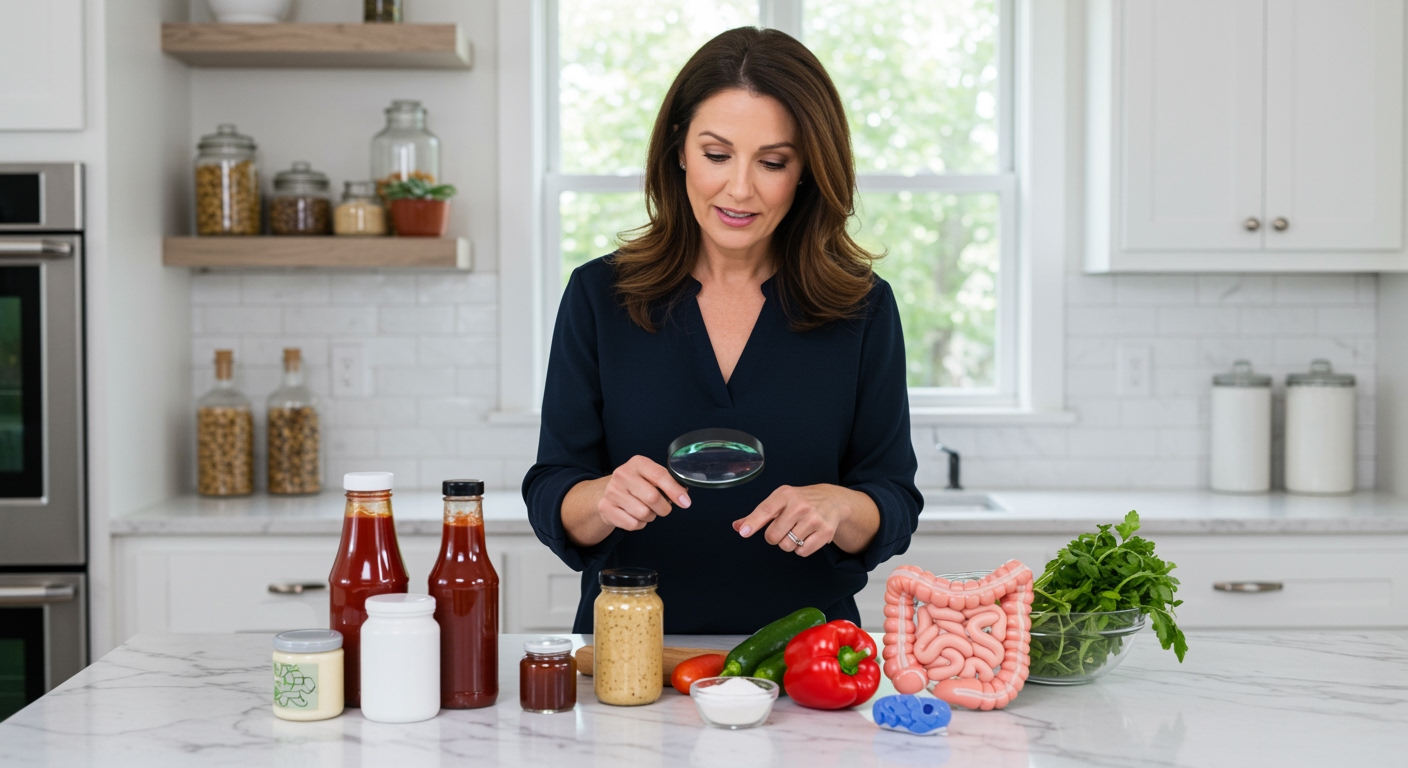✪ Key Highlight: Common food thickeners in processed foods can actually be digested by gut bacteria when plant fibers prime them.
Introduction
You probably eat food thickeners every single day without even knowing it.
Scientists at the University of British Columbia just shattered a decades-old belief about these common additives found in ketchup, salad dressing, and countless processed foods.
Hi, I’m Abdur, your nutrition coach and today I’m going to analyze this groundbreaking research that changes everything we thought we knew about how our bodies handle artificial food thickeners.
What Are These Food Thickeners Really?
Cellulose-based thickeners are artificial versions of natural plant fibers that food companies add to improve texture and shelf life.
These additives work like magic in processed foods because their complex molecular structure makes them excellent at thickening and stabilizing products.
You find them in everything from condiments to personal care products like toothpaste.
Food scientists designed these molecules to be so tough that they believed our digestive systems could not break them down.
This same toughness is why these thickeners are sometimes used as laxatives when consumed in large amounts.
The assumption was simple: these artificial compounds would pass through your body completely unchanged, providing texture benefits without any metabolic impact.
✪ Fact: These thickeners are so common that you likely consume them multiple times daily without realizing it.
How Did Scientists Discover This Digestive Process?
Dr. Deepesh Panwar and his team at the University of British Columbia conducted experiments that mimicked a diet rich in natural polysaccharides.
Polysaccharides are long chains of sugars found in fruits, vegetables, and cereals that serve as natural plant fibers.
The researchers discovered that when gut bacteria are exposed to these natural plant fibers, they become “primed” for enhanced digestive activity.
This priming process activates special enzymes on the surface of certain bacteria that can also break down artificial cellulose molecules.
The study focused on bacteria in the Bacteroidota phylum, which are common residents of healthy human gut microbiomes.
These microbes express powerful enzymes on their surfaces that can digest even the tough artificial cellulose derivatives once they are properly activated.
The research was conducted in vitro, meaning outside the human body, but it provides detailed insights into what likely happens in our digestive tracts.
✪ Pro Tip: Eating diverse plant foods helps your gut bacteria develop more powerful digestive capabilities.
Why Does Plant Fiber Make The Difference?
The key breakthrough lies in understanding how natural plant fibers prepare your gut bacteria for more complex digestive tasks.
When you eat foods rich in natural polysaccharides, your gut bacteria essentially “learn” to produce more diverse and powerful enzymes.
This enzymatic preparation creates a domino effect that extends beyond digesting natural fibers.
The same enzymes that break down natural cellulose from plants can also tackle the artificial cellulose derivatives in processed foods.
This discovery reveals a complex interaction between your dietary choices and your gut microbiome capabilities.
People who eat more plant-based foods essentially give their gut bacteria the tools to digest a wider range of substances, including man-made additives.
This finding challenges the traditional view that artificial food additives simply pass through our systems without any biological interaction.
✪ Note: Your gut bacteria adapt their digestive capabilities based on what you regularly feed them.
What Does This Mean For Your Health?
This research adds another layer of complexity to the ongoing debate about food additives and gut health.
While this study shows that cellulose-based thickeners can be broken down, other research has raised concerns about potential negative effects of food additives.
Some animal studies have linked high intake of emulsifiers and stabilizers to inflammation and changes in the gut barrier function.
However, more research is needed to determine safe consumption levels for humans and understand long-term health implications.
The University of British Columbia discovery suggests that our gut bacteria are much more adaptable than previously thought.
This adaptability means that dietary patterns can significantly influence how our bodies process various food components, including artificial additives.
The research highlights the importance of maintaining a diet rich in natural plant fibers, not just for their direct health benefits, but also for their role in optimizing gut bacterial function.
✪ Pro Tip: Focus on whole foods while being mindful of processed food consumption to support optimal gut health.
The Bottom Line
This groundbreaking research proves that our understanding of food additives and digestion is far from complete.
Your gut bacteria are sophisticated chemical factories that adapt based on what you feed them regularly.
I would love to hear your thoughts about this discovery and how it might change your approach to reading ingredient labels – please share your questions or opinions in the comments below.
References
At NutritionCrown, we use quality and credible sources to ensure our content is accurate and trustworthy. Below are the sources referenced in creating this article:
- SciTechDaily: For Decades, Scientists Believed These Common Food Thickeners Were Indigestible – They Were Wrong
- EurekAlert: Common food thickeners, long thought to pass right through us, are actually digested
- UBC Michael Smith Laboratories: Common food thickeners, long thought to pass right through us, are actually digested
- BioEngineer: Common Food Thickeners Once Believed Indigestible Are Actually Broken Down in Our Bodies
- PMC: Research Study on Food Additives and Gut Health





